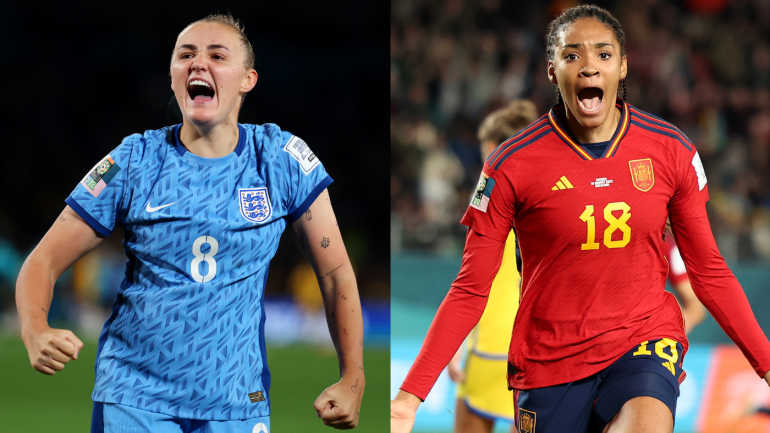
Spain and England will duke it out in Sydney on Sunday for the Women's World Cup, as each side play in soccer's biggest game for the first time.
England manager Sarina Wiegman aims to follow up last year's impressive victory at the Euros with a World Cup title, and made it to Sydney despite losing three important players to injury before the tournament began and suffering a lineup-disrupting suspension to Lauren James in the middle of the tournament. She has skillfully utilized England's deep pool of players to earn a spot in the final, and the Lionesses arrive at the match as the favorites to win the title.
Spain have long been a team on the rise and lived up to the hype Down Under thanks to the country's trademark style of play. La Roja won their first-ever knockout match at a major international tournament at this World Cup, and rode the momentum to the final as the likes of Aitana Bonmati and 19-year-old Salma Paralluelo made a name for themselves at the tournament.
The meeting sets up a high-stakes tactical battle for Wiegman and Spain's Jorge Vilda, and a star-making turn for a handful of players in the biggest game of their careers.
Will the stars start in Sydney?
Both managers will have major lineup decisions to make for the final, especially as it pertains to a pair of attack-minded stars. James will be available for England after serving a two-match ban for a red card she picked up in the round of 16 triumph over Nigeria, and before that was the team's standout player with three goals and three assists through the first four games. Ella Toone has slotted in nicely in James' absence, though, and scored in England's semifinal victory over Australia.
As for Spain, the question is whether or not to start Putellas. The Ballon d'Or winner has yet to hit her top form as she recovers from an ACL tear suffered in April, nor has she put in a 90 minute shift at the World Cup. Her most recent start came in Spain's semifinal win over Sweden, but she put in a nondescript performance. She took no shots and created no chances in her 57 minute cameo, much of which came during a first half in which Sweden's high line virtually neutralized Spain's attack.
Don't miss CBS Sports Golazo Network's Morning Footy, now in podcast form! Our crew brings you all the news, views, highlights and laughs you need to follow the Beautiful Game in every corner of the globe, every Monday-Friday all year long
Vilda will need to decide if Putellas may have a better shot against England from the start, or opt elsewhere. Jennifer Hermoso has played in midfield in Putellas' absence, which left a spot open at center forward frequently occupied by Esther Gonzalez. The coaching staff will also have to decide if teen sensation Paralluelo will be impactful from the start in the final -- she started three games earlier in the tournament, but broke out with goals as a substitute in the quarterfinals and semifinals.
Who will dominate possession?
En route to the final, both teams have won the possession battle in just about every match they've played. Spain and England rank as two of the top three teams for average possession per game with 70% and 65% of the ball, respectively, behind only Germany, who were eliminated in the group stage, at 71%. While England have seen their possession mark slip into the 50% range against Nigeria and in the semifinal against Australia, Spain have yet to have less than 60% of the ball at the World Cup. The matchup sets up a fascinating tactical battle for two teams who have usually been the dominant side during their time Down Under.
It seems likely that Vilda will stick to Spain's world famous game plan for the final, but Sweden provided the blueprint on how to stifle La Roja even in possession by limiting them to just three shots in the first half. It's worth wondering if Wiegman will take notes from that approach, or she will stick to her tried-and-true approach.
If England end up with a lot of the ball, though, it will truly ask questions of Spain for the first time at the World Cup. The pressure might be on Spain to maintain their dominance against the toughest opponent they've faced Down Under, or to adapt their style of play in some way to stay in the game.
Who will take their chances?
It almost sounds superficial, but just like every match before it, the final will likely come down to each team's goalscoring ability. The reason it's worth bringing up here, though, is because this World Cup has been a roller coaster for both England and Spain's offensive output. There have been days where each team put on attacking masterclasses, and others when they struggled to find the back of the net.
England started off the tournament with a 1-0 win over Haiti in which they significantly underperformed on their expected goals tally of 2.6. They also looked unimpressive in attack in their 1-0 group stage win over Denmark and failed to score against Nigeria, but have developed a nose for goal as the World Cup progressed. They now rank third in the tournament for goals (11) and shots (87) as well as shot on target percentage (41.4%), but have also made their chances count on imperfect days. England rank sixth on expected goals, and were behind on that statistical point to both Nigeria and Australia. Against the Matildas, though, they managed to score three and made their chances count.
Spain have almost operated in the opposite direction. The team posted some lopsided scores early in the competition, which was clearly a sign of attacking prowess. Spain have scored 16 goals, the most goals of any team at the World Cup, and also have the most shots (143) and highest expected goals total (18.3). The team, though, rank 13th for shots on target percentage at 31.5%, demonstrating a lack of finishing ability at times. That was notably the case in the quarterfinal win over the Netherlands, when they had 27 shots and an expected goals score of 3.4 but only seven shots on target. Spain did not score until the 81st minute through a penalty, and had to go to extra time to secure victory.
It is paramount for both teams to be intentional with their chances in front of goal on Sunday. If not, the loser risks being haunted by missed chances while the champions take in their victory lap.





















